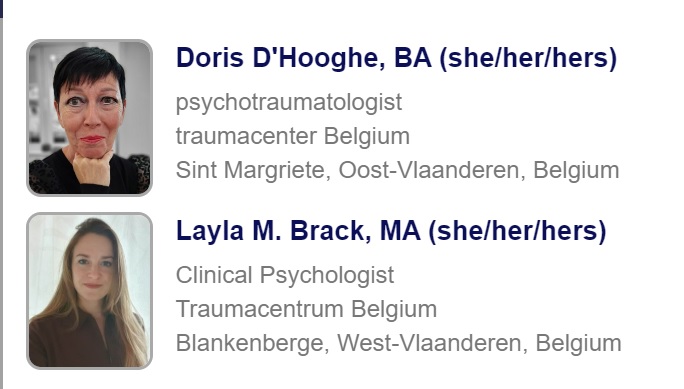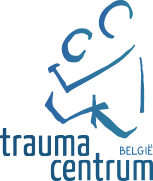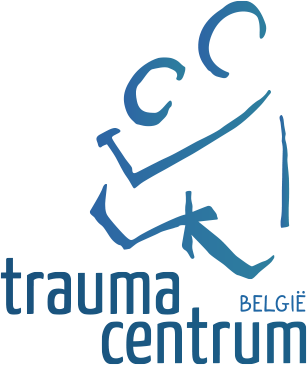ISSTD 40th Annual Conference Omni Louisville Hotel | Louisville, KY USA Main Conference: April 15-17, 2023
- Doris and Layla will give a 3 hour workshop, Holistic Trauma and Dissociation Treatment Planner, @ ISSTD 40th Annual Conference
Omni Louisville Hotel | Louisville, KY USA
Main Conference: April 15-17, 2023
ISSTD 40th Annual Conference

3 HOUR WORKSHOP
Holistic Trauma and Dissociation Treatment Planner
Sunday, April 16, 2023
8:30 AM – 12:00 PM US Eastern Time
Learning Level: Advanced
This session is available for 3.00 APA and ASWB credits.
Abstract
It is hypothesized that the highest number of traumatic experiences are interpersonal and that the resulting consequences are more devastating when committed by acquaintances of the child. Clinical practice has shown the presence of “Invisible Attachment Trauma” which is not about an obvious adverse experience but about the quality of parenting. To develop a safe attachment relationship, this quality mainly depends on the caregivers’ ability to mentalize, regulate, respond sensitively, and play, …The absence of these features causes traumatic stress in the child and impacts his neuro-bio-psycho-social development and the possibility to attach. Attachment research has also indicated the connection between “Invisible Attachment Trauma" and the development of dissociative symptomatology. Theory suggests that there is a unique inborn core self. When trauma disrupts the unfolding of this core, it triggers the development of dissociative symptoms. And simultaneously, trauma compromises the connection with it. In this workshop, we want to redefine dissociation. When chronic traumatic stress is of an interpersonal nature, it evokes a trauma response that acts as a protective mechanism. This trauma response causes various disruptions in diverse developmental domains of the person, resulting in specific dissociative symptoms. From this point, we elaborated eight developmental domains: relational, needs, neurobiological, emotional, body, cognitive, Self, and spiritual, to comprehend and categorize particular dissociative symptoms. These different dissociative symptoms are classified in corresponding dissociative continuums e.g., the dissociative neurobiological continuum. So, we redefine dissociation as “a disruption of development” in these distinct domains of the personality. In this workshop, we teach how to use an Intake Model to facilitate a proper assessment and early diagnosis. Participants learn to assemble the received data into a trauma chart from which we map the consequences within the eight domains. The treatment planner links the dissociative symptoms with a corresponding, precise, integrative, and tailor-made treatment.
Abstract
It is hypothesized that the highest number of traumatic experiences are interpersonal and that the resulting consequences are more devastating when committed by acquaintances of the child. Clinical practice has shown the presence of “Invisible Attachment Trauma” which is not about an obvious adverse experience but about the quality of parenting. To develop a safe attachment relationship, this quality mainly depends on the caregivers’ ability to mentalize, regulate, respond sensitively, and play, …The absence of these features causes traumatic stress in the child and impacts his neuro-bio-psycho-social development and the possibility to attach. Attachment research has also indicated the connection between “Invisible Attachment Trauma" and the development of dissociative symptomatology. Theory suggests that there is a unique inborn core self. When trauma disrupts the unfolding of this core, it triggers the development of dissociative symptoms. And simultaneously, trauma compromises the connection with it. In this workshop, we want to redefine dissociation. When chronic traumatic stress is of an interpersonal nature, it evokes a trauma response that acts as a protective mechanism. This trauma response causes various disruptions in diverse developmental domains of the person, resulting in specific dissociative symptoms. From this point, we elaborated eight developmental domains: relational, needs, neurobiological, emotional, body, cognitive, Self, and spiritual, to comprehend and categorize particular dissociative symptoms. These different dissociative symptoms are classified in corresponding dissociative continuums e.g., the dissociative neurobiological continuum. So, we redefine dissociation as “a disruption of development” in these distinct domains of the personality. In this workshop, we teach how to use an Intake Model to facilitate a proper assessment and early diagnosis. Participants learn to assemble the received data into a trauma chart from which we map the consequences within the eight domains. The treatment planner links the dissociative symptoms with a corresponding, precise, integrative, and tailor-made treatment.
Learning Objectives:
At the conclusion of this session participants will be able to:
- Define "Invisible Attachment trauma" and its consequences
- Recognize the different dissociative symptoms and schedule these on the corresponding dissociative continuums
- Practice the presented model in their clinical practice
- Formulate, derived from the trauma chart, an appropriate treatment plan
- Evaluate which treatment modality to apply according to the developmental dissociative continuum


